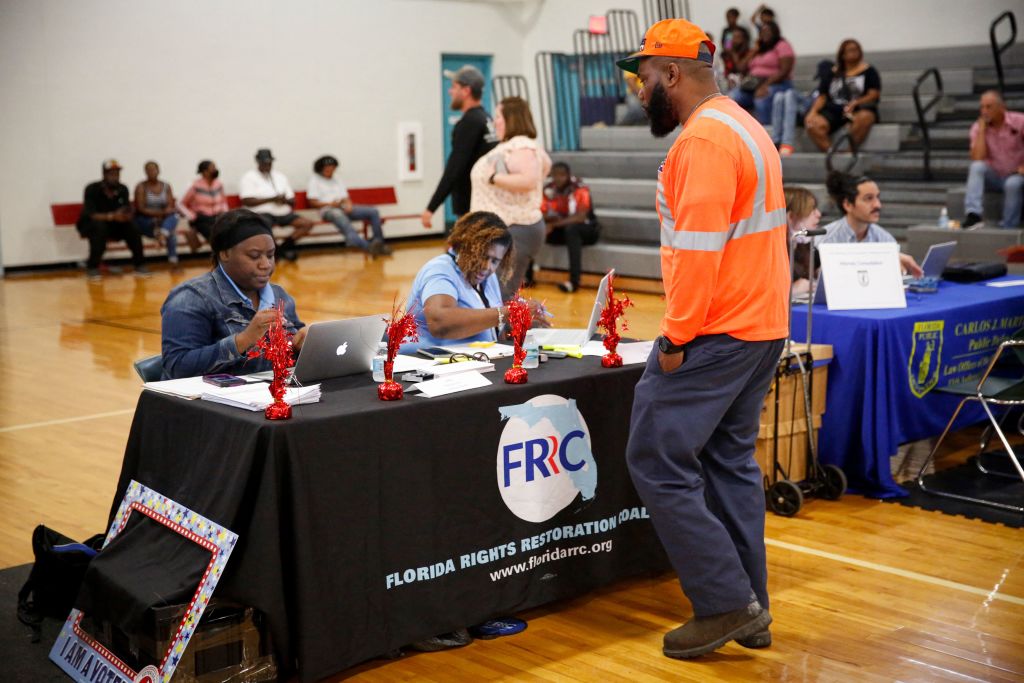Voting Rights Restoration Remains Important Ahead Of Midterm Elections
Source: MARCO BELLO / Getty
Registering to vote and casting one’s ballot is an essential part of full citizenship. But for some Americans, the right to vote is beyond reach due to felony disenfranchisement.
Efforts to restore voting rights have picked up in recent years. How and when a person is entitled to have the right to vote can be a complicated endeavor. Even in states with Democratic governors, like Kentucky, restoring the right to vote can be complex.
These anti-democratic policies block people’s access to the ballot and, in some cases, can pave the way for aggressive criminal prosecutions. Shelby County district attorney Amy Weirich recently lost her re-election bid after prosecuting voting rights advocate Pamela Moses for alleged voter fraud. Weirich went forward with the case despite evidence suggesting an agency error in clearing Moses to vote.
Under the leadership of Florida Gov. Ron DeSantis, Sunshine state officials targeted incarcerated individuals for registering to vote and, in some cases casting ballots, but whose registration had been processed and approved by the state of Florida. There is no indication in any of the cases that people intentionally misled election officials.
North Carolina offers a silver lining, where thousands of formerly incarcerated people had their rights recently restored after litigation led by Forward Justice on behalf of four organizational plaintiffs and six individuals. BlackPAC’s executive director and founder Adrianne Shropshire called the recent North Carolina ruling restoring voting rights for many formerly incarcerated people “the greatest expansion of voting rights in North Carolina since the Voting Rights Act.”
This #NationalVoterRegistrationDay, John Legend’s @letsfreeamerica and @flrightsrestore are encouraging eligible formerly incarcerated Americans to #VoteForOurFreedom this election season & register to vote. Get resources here: https://t.co/OpcOtgreuM pic.twitter.com/x2QiM5elQW
— Voice of the Experienced (VOTE) (@FIPVOTENOLA) September 20, 2022
Getting the information about eligibility to vote is the first step. Read along to find out more about restoring your right to vote.
What is felony disenfranchisement?
Felony disenfranchisement refers to barring individuals convicted of felonies from being able to vote. It impacts elections at all levels of government. Felony disenfranchisement laws often date back to the Jim Crow era and historically targeted Black people.
According to the National Conference of State Legislatures, people convicted of felonies do not lose the right to vote in Maine, Vermont and D.C.
Another 21 states automatically restore voting rights upon release, and 16 states automatically restore voting rights after a specified period post-incarceration. In many cases, people will be eligible once parole and/or probation has been completed. But 11 states do not have a process for automatic restoration.
How does restoration of rights work?
Often those who have been convicted of felonies do not know when their voting rights are restored or what steps to take. Restoration of voting rights vary across the 50 states and the District of Columbia.
Note people who are pre-conviction and do not otherwise have a prohibiting felony do not lose their right to vote. Some groups, such as the Albany Voter’s Coalition, located in southwest Georgia, have worked to support the voting rights of people detained pre-trial.
But gaps in the political process have made it difficult for potential voters in detention. A January 2022 report from the U.S. Commission on Civil rights revealed that more than 60% of defendants were detailed pre-trial due to their inability to pay bail.
Why is the restoration of rights important?
Millions of otherwise eligible people are blocked from exercising their constitutional right to vote due to felony disenfranchisement. An October 2020 study from the Sentencing Project estimated that 2.3% of the voting age population are disenfranchised due to having a prior felony conviction.
The Formerly Incarcerated & Convicted People and Families Movement (FICPFM) estimates that up to 18 million Americans may be barred from ballot access. Barriers to participation deny people the ability to have a say in how their communities are governed. Groups like Free Hearts in Tennessee, V.O.T.E. in Louisiana, and the Florida Rights Restoration Coalition work to support residents who may have a felony conviction navigate the sometimes tricky process.
Voters should check with their local board of elections or advocacy groups that help restore voting rights in your area. FICPFM created a tool to help potential voters find the information needed to start the process.
And even if a voter can’t restore their right to vote this election cycle, there are still ways to be involved in making a change at the community level and beyond. Find an organization that speaks to the issues that matter to you, groups are always in need of good volunteers.
Written by NewsOne’s editorial team.
PAID FOR BY BLACKPAC, BLACKPAC.COM, AND BLACK PROGRESSIVE ACTION COALITION, BLACKPROGRESSIVEACTION.ORG. NOT AUTHORIZED BY ANY CANDIDATE OR CANDIDATE’S COMMITTEE.
SEE ALSO:
Know Before You Vote: Election Law Changes Ahead Of The 2022 Midterms
Democracy Is Always On The Ballot For Black People
The post Voting Rights Restoration Remains Important Ahead Of Midterm Elections appeared first on NewsOne.

